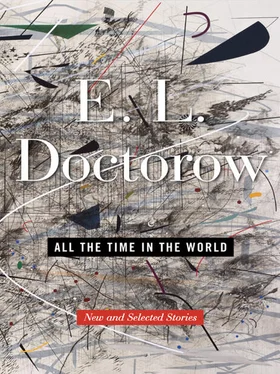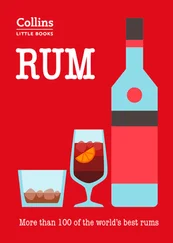That evening, at the kitchen table, I pushed my homework aside and composed a letter. I tried to imagine my father’s response to his new life. He had never been west. He had never traveled anywhere. In his generation the great journey was from the working class to the professional class. He hadn’t managed that either. But he loved New York, where he had been born and lived his life, and he was always discovering new things about it. He especially loved the old parts of the city below Canal Street, where he would find ships’ chandlers or firms that wholesaled in spices and teas. He was a salesman for an appliance jobber with accounts all over the city. He liked to bring home rare cheeses or exotic foreign vegetables that were sold only in certain neighborhoods. Once he brought home a barometer, another time an antique ship’s telescope in a wooden case with a brass snap.
“Dear Mama,” I wrote. “Arizona is beautiful. The sun shines all day and the air is warm and I feel better than I have in years. The desert is not as barren as you would expect, but filled with wildflowers and cactus plants and peculiar crooked trees that look like men holding their arms out. You can see great distances in whatever direction you turn and to the west is a range of mountains maybe fifty miles from here, but in the morning with the sun on them you can see the snow on their crests.”
My aunt called some days later and told me it was when she read this letter aloud to the old lady that the full effect of Jack’s death came over her. She had to excuse herself and went out in the parking lot to cry. “I wept so,” she said. “I felt such terrible longing for him. You’re so right, he loved to go places, he loved life, he loved everything.”
WE BEGAN trying to organize our lives. My father had borrowed money against his insurance and there was very little left. Some commissions were still due but it didn’t look as if his firm would honor them. There was a couple of thousand dollars in a savings bank that had to be maintained there until the estate was settled. The lawyer involved was Aunt Frances’ husband and he was very proper. “The estate!” my mother muttered, gesturing as if to pull out her hair. “The estate!” She applied for a job part-time in the admissions office of the hospital where my father’s terminal illness had been diagnosed, and where he had spent some months until they had sent him home to die. She knew a lot of the doctors and staff and she had learned “from bitter experience,” as she told them, about the hospital routine. She was hired.
I hated that hospital, it was dark and grim and full of tortured people. I thought it was masochistic of my mother to seek out a job there, but did not tell her so.
We lived in an apartment on the corner of 175th Street and the Grand Concourse, one flight up. Three rooms. I shared the bedroom with my brother. It was jammed with furniture because when my father had required a hospital bed in the last weeks of his illness we had moved some of the living-room pieces into the bedroom and made over the living room for him. We had to navigate bookcases, beds, a gateleg table, bureaus, a record player and radio console, stacks of 78 albums, my brother’s trombone and music stand, and so on. My mother continued to sleep on the convertible sofa in the living room that had been their bed before his illness. The two rooms were connected by a narrow hall made even narrower by bookcases along the wall. Off the hall were a small kitchen and dinette and a bathroom. There were lots of appliances in the kitchen — broiler, toaster, pressure cooker, countertop dishwasher, blender — that my father had gotten through his job, at cost. A treasured phrase in our house: at cost . But most of these fixtures went unused because my mother did not care for them. Chromium devices with timers or gauges that required the reading of elaborate instructions were not for her. They were in part responsible for the awful clutter of our lives and now she wanted to get rid of them. “We’re being buried,” she said. “Who needs them!”
So we agreed to throw out or sell anything inessential. While I found boxes for the appliances and my brother tied the boxes with twine, my mother opened my father’s closet and took out his clothes. He had several suits because as a salesman he needed to look his best. My mother wanted us to try on his suits to see which of them could be altered and used. My brother refused to try them on. I tried on one jacket, which was too large for me. The lining inside the sleeves chilled my arms and the vaguest scent of my father’s being came to me.
“This is way too big,” I said.
“Don’t worry,” my mother said. “I had it cleaned. Would I let you wear it if I hadn’t?”
It was the evening, the end of winter, and snow was coming down on the windowsill and melting as it settled. The ceiling bulb glared on a pile of my father’s suits and trousers on hangers flung across the bed in the shape of a dead man. We refused to try on anything more, and my mother began to cry.
“What are you crying for?” my brother shouted. “You wanted to get rid of things, didn’t you?”
A FEW WEEKS later my aunt phoned again and said she thought it would be necessary to have another letter from Jack. Grandma had fallen out of her chair and bruised herself and was very depressed.
“How long does this go on?” my mother said.
“It’s not so terrible,” my aunt said, “for the little time left to make things easier for her.”
My mother slammed down the phone. “He can’t even die when he wants to!” she cried. “Even death comes second to Mama! What are they afraid of, the shock will kill her? Nothing can kill her. She’s indestructible! A stake through the heart couldn’t kill her!”
When I sat down in the kitchen to write the letter I found it more difficult than the first one. “Don’t watch me,” I said to my brother. “It’s hard enough.”
“You don’t have to do something just because someone wants you to,” Harold said. He was two years older than me and had started at City College; but when my father became ill he had switched to night school and gotten a job in a record store.
“Dear Mama,” I wrote. “I hope you’re feeling well. We’re all fit as a fiddle. The life here is good and the people are very friendly and informal. Nobody wears suits and ties here. Just a pair of slacks and a short-sleeved shirt. Perhaps a sweater in the evening. I have bought into a very successful radio and record business and I’m doing very well. You remember Jack’s Electric, my old place on Forty-third Street? Well, now it’s Jack’s Arizona Electric and we have a line of television sets as well.”
I sent that letter off to my aunt Frances, and as we all knew she would, she phoned soon after. My brother held his hand over the mouthpiece. “It’s Frances with her latest review,” he said.
“Jonathan? You’re a very talented young man. I just wanted to tell you what a blessing your letter was. Her whole face lit up when I read the part about Jack’s store. That would be an excellent way to continue.”
“Well, I hope I don’t have to do this anymore, Aunt Frances. It’s not very honest.”
Her tone changed. “Is your mother there? Let me talk to her.”
“She’s not here,” I said.
“Tell her not to worry,” my aunt said. “A poor old lady who has never wished anything but the best for her will soon die.”
I did not repeat this to my mother, for whom it would have been one more in the family anthology of unforgivable remarks. But then I had to suffer it myself for the possible truth it might embody. Each side defended its position with rhetoric, but I, who wanted peace, rationalized the snubs and rebuffs each inflicted on the other, taking no stands, like my father himself.
Читать дальше












